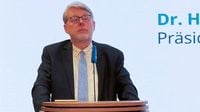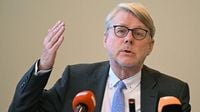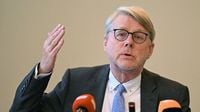In a bold move that could reshape Germany's approach to migration, Hans-Eckhard Sommer, the President of the Federal Office for Migration and Refugees (BAMF), has called for a radical reform of the country's asylum system. Speaking at the Konrad Adenauer Foundation on March 31, 2025, Sommer proposed the abolition of the current individual right to asylum, suggesting that Germany should instead implement a controlled humanitarian program for accepting refugees.
Sommer's remarks come at a time when the country is grappling with ongoing coalition negotiations between the Christian Democratic Union (CDU) and the Social Democratic Party (SPD) regarding migration policies. His call for change is seen as a significant departure from existing practices, which he described as "cynical" and prone to abuse. "Our cynical asylum system does not allow for a limitation of migration. It invites abuse," Sommer stated, emphasizing the need for a new model that prioritizes humanitarian considerations and labor market integration.
Under Sommer's proposed framework, refugees would be selected based on clear criteria, such as humanitarian need and the demand for labor in Germany, and flown into the country rather than allowing uncontrolled migration. He argued that this approach would significantly reduce the influence of human traffickers, stating, "We would largely dry up the smugglers' business." However, he did not specify how many individuals would be admitted under this new system, only referring to a number that would be of "considerable height."
Sommer's proposals have sparked debate among political leaders and the public. He emphasized that the current system is not only unfair but also dangerous, particularly for vulnerable populations. "The inner security and social cohesion are being put at risk," he warned, highlighting that the existing asylum processes tend to favor young men who can afford to flee, leaving behind women, the sick, and families.
Moreover, Sommer expressed concern about the rise of populist and right-wing extremist parties in Europe, suggesting that the failure to address migration effectively could jeopardize the democratic constitutional state. "Politics can do a lot if it only wants to," he asserted, encouraging lawmakers to rethink their strategies. He pointed out that recent shifts in European political dynamics could open the door for new solutions, including potential amendments to international agreements like the Geneva Refugee Convention.
Despite the potential for significant change, Sommer clarified that he was presenting his personal views rather than official BAMF policy. Nevertheless, his position lends weight to the discussion, as he has led the agency since 2018 and is a member of the Christian Social Union (CSU).
In 2024, Germany saw a decline in asylum applications, with 229,751 first-time requests and 21,194 subsequent applications, marking a 30.2% drop from the previous year. Sommer attributed this decrease to the effective closure of the route to Hungary by Serbia, raising questions about the sustainability of this trend.
As the debate continues, Sommer's proposals challenge the status quo and call for a reevaluation of Germany's commitments to asylum seekers. His vision for a humanitarian admission system echoes practices seen in other countries, such as Canada, and raises critical questions about the future of migration policy in Europe.
Critics of Sommer's approach have raised concerns about the implications for human rights and the fundamental principles of asylum. In response to audience inquiries about whether his proposals threaten these values, Sommer defended his stance, asserting that the current system's inefficiencies and abuses necessitate a reevaluation of how Germany approaches refugee admissions.
In conclusion, Hans-Eckhard Sommer's call for a radical transformation of Germany's asylum policy has ignited a crucial conversation about the future of migration in Europe. As the country navigates complex political landscapes and rising public sentiment around migration, the implications of Sommer's proposals will likely be felt far beyond Germany's borders.






